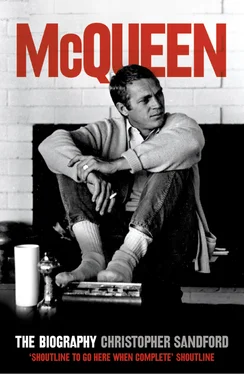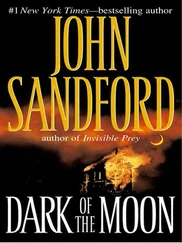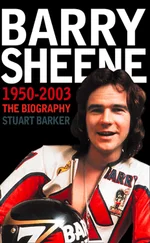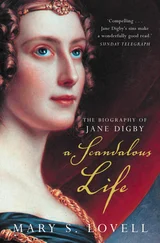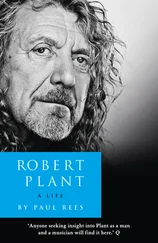Steve very soon changed and then embodied most people’s stereotype of a cowboy. Rugged, wan and bow-legged like a prairie John Wayne, self-contained, cool, he also liberated the postmodern, ironic school which sprang up in the years ahead. In an equivalent move, thousands of female fans – many of them defecting from Como’s jacuzzi – duly responded to the all-action hero who had the nerve to, as he put it, both ‘fight and think’. Men simply wanted to be like him.
Elsewhere, however, it was another story. Behind the scenes, among at least some of Wanted ’s crew and cast, it’s fair to say that McQueen wasn’t just not liked, he was disliked. For one, there was his relationship with the show’s primary advertiser, Viceroy cigarettes. Steve’s contract called for him to be wheeled out, in character as the star Josh Randall, to make his periodic pitch (‘It’s good entertainment for the whole family…yessir…and that’s what’ll sell any product’) for both sponsor and series. Somehow, the way he did it was always thought to be lacking in warmth. One ex-Viceroy mogul, Nick Payne, recalls McQueen working the company’s convention, ‘cruising the room like a zombie…He’d stare at you with that squinty, butch look, offer a “Howdy, mac” and move on, his arm outstretched to his next mark. What I remember him telling us was that he’d sold millions of cigarettes for us, for a few bucks’ return,’ says Payne. ‘Been there, done that. It was extremely flip.’ McQueen’s tone was cool, his grip cold and clammy. Nor did he exactly endear himself to the Viceroy suits by ostentatiously smoking one of their rivals’ brands. ‘It was obvious to most of us that Steve was a so-so salesman, and that the product he was really plugging was himself.’
McQueen became a star, but he didn’t immediately decide who Josh Randall was. It was an important question, quite apart from its personal stake for him, because it involved the whole business of anti-heroic acting. Steve began his invention of the future by going back to the past, specifically to the hoary Western star Randolph Scott and his 1954 The Bounty Hunter. He worked out characteristic poses, moves, both by constant rehearsal and by studying the masters. But McQueen was always much more than a clever copyist. For one thing, he was small for a leading man, giving Randall the advantage of the underdog. Trackdown ’s producer Vince Fennelly would remember that ‘I needed a kind of “little guy” who looks tough enough to get the job done, but with a kind of boyish appeal…He had to be vulnerable , so the audience would root for him against the bad guys. McQueen was just what I had in mind. I knew he was my man the minute he walked through the door.’ When the character got in a fight, he’d do exactly what his alter ego did to his old marine buddy Joey – wait until the odds were even, and then deliver a quick beating. There was nothing particularly macho about Josh Randall. When two or three men came at him at once, he either high-tailed it out of town or, at a pinch, pulled the Mare’s Laig – his whole weight leaning into the gun, levelling it as easily as if it were a pistol. It was an extension of McQueen’s nervous system. Steve’s control of both his props and his body was always masterful, with no energy wasted. Finally, for authenticity’s sake, he got rid of the designer jeans and starchy shirts and wandered around in what looked like Scott’s old duds and a scuffed hat. It was the reverse of the classic Hollywood makeover, and it worked.
Much as McQueen had superb control of his body, he was also (as Viceroy now dubbed him) the thinking man’s cowboy. In 1979 he startled an old guest star on Wanted by recalling how ‘something in my look had once moved him during a take, and instead of punching me out, as we’d rehearsed, he’d just gently helped me up onto my horse. That’s the way we shot it, and I kept thinking Steve had obviously gone nuts and that it was now a lousy scene. Then when I saw it on TV, I couldn’t believe what came across. McQueen made it deeper and subtler, less bad cop and more Jimmy Stewart, and he did it all, I finally learnt, on the fly.’ Steve would never talk much about that dread word ‘motivation’. But he revealed clearly enough to men like Elkins the churning McQueen interior that so drove his work, and so embedded another actor’s scared look in twenty years’ memories of pity. His character, he once rightly said, was a ‘contradictory dude’. He was talking about Randall, but it was a self-sketch if ever there was one.
Besides the audience, Steve’s only other long-term relationship on Wanted was with trouble. He yelled at directors, writers, wardrobe men – particularly the last if their gear wasn’t pilgrim enough, namely too clean. Everything had to be perfect. If it wasn’t, you fixed it. ‘He was a shit’ comes Wanted ’s echo of him again and again. Always, everywhere. McQueen even fought with Ronald Reagan over a script for the latter’s ‘General Electric Theater’. He wasn’t doing any stinking guest spot, he announced. Compared to Steve, Reagan ambled along as loose and haphazard as a tumbleweed.
Two men got closer to him than most. One was Dave Foster, his publicist and later co-producer of The Gateway. Foster was to play a major part in the unfolding drama of McQueen’s career and, particularly, his morbid distrust of the press. He also met his stunt double of twenty-two years, Loren Janes. Janes got the job only after Steve had fired three other stuntmen – two because they had the wrong look, the third because he ribbed McQueen about his name – on the very first day of shooting. To colleagues like Janes, the pattern was jagged but constant. They generally accepted Steve with affection and respect for his sincerity, talent and total absorption in the part. They smiled a bit over his petulance, particularly towards those above him on the food-chain. ‘McQueen raged nonstop at the suits,’ says one of the Wanted crew. Contrarily, and particularly to those below him on the food-chain, he developed a reputation for being, on a whim, ‘either a prince or a royal pain in the ass’. Mostly, they felt that he tried too hard and had too much front, and they were uncomfortable with his obsessive concern with future glory, which he couldn’t resist airing from time to time.
He had no close friends.
The same colleagues were divided on whether McQueen was a shit or merely too serious: pathologically nasty or exercising a due quality control. But the results were clear enough. In the three years it was on air, Wanted became a proving ground for several noted directors of the near future, including Dick Donner of Superman and Lethal Weapon fame. Steve gave Donner ‘utter crap’ when he first appeared on set, blaming him for every conceivable hassle from the script to the quality of the canteen lunch. Donner was driven home that night quite literally in tears. When McQueen decided to bare fang like that, there was a touch of the bad cop. Not Jimmy Stewart. It was a side of him that alienated many co-workers and ‘didn’t allow him to be accepted as much as he might have been’. Things were hardly less ugly further down the evolutionary ladder, with Josh Randall’s horse. This jet-black bronco, named Ringo, was once called upon to stand patiently behind McQueen as he rehearsed a scene with another actor. Instead, startled by the noise and lights, the animal first head-butted and then reared up and stamped on Steve’s back. As McQueen spun round, his mount at once made ready to bite him. Steve cocked back his fist, popping it in the ‘chops’, then hurled his script into the air and, as Ringo snapped its halter, ran for his life. After that particular chase petered out, McQueen and his horse got along famously together.
Читать дальше
